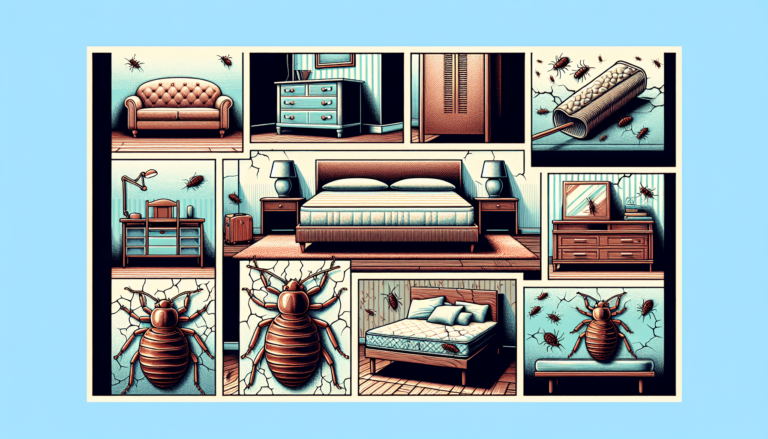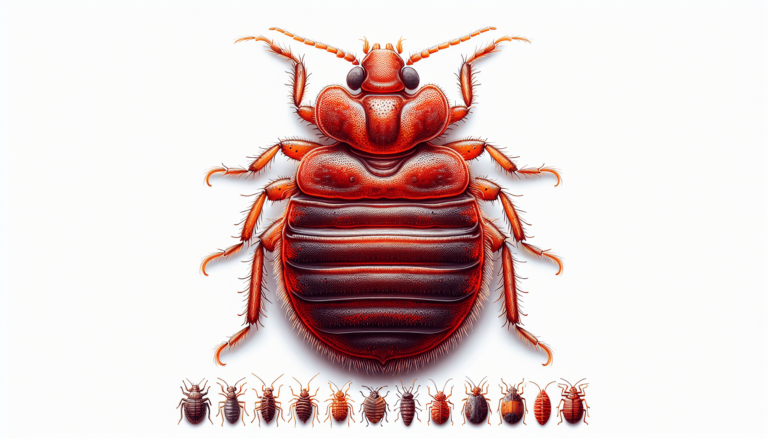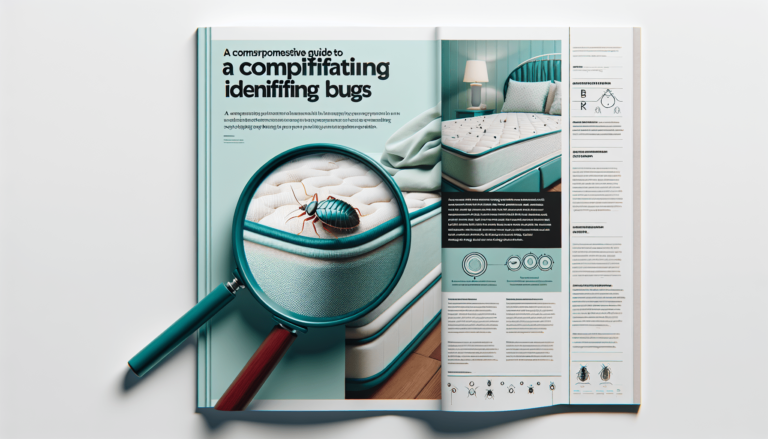What Do Bed Bugs Smell Like?
“What Do Bed Bugs Smell Like?”
Bed bugs, those tiny pests that can wreak havoc on your sleep and peace of mind. You’ve probably heard of them, but do you know what they smell like? The scent of these elusive creatures can actually serve as a telltale sign of their presence. As an expert in bed bug infestations, I have spent a lifetime studying these pests and can confidently tell you that they emit a distinct odor. In this article, I will provide you with a comprehensive guide on what bed bugs smell like, backed by relevant lists, stats, and facts. So, if you’re tired of being ignorant about these pesky bugs and want to arm yourself with valuable knowledge, read on.

The Scent of Bed Bugs
Bed bugs are notorious for infesting homes and causing distress to those affected. One notable characteristic of these pests is the distinctive odor they emit. In this article, we will delve into the scent of bed bugs, its comparison with other common odors, and the scientific explanation behind it.
Description of the Scent
The scent of bed bugs has often been likened to a sweet, musty odor. Many people describe it as a combination of coriander, almonds, and moldy raspberries. This unique scent can be detected even in small infestations and becomes more pronounced as the number of bed bugs increases.
Comparison with Other Common Odors
When it comes to comparing the scent of bed bugs with other common odors, it is important to note that each odor is distinct. While bed bug scent may have hints of sweetness, it is significantly different from other typical household smells. It is essential to be able to differentiate the scent of bed bugs from odors such as dirty laundry, musty basements, or rotten food.
Scientific Explanation for the Odor
The distinct scent emitted by bed bugs can be attributed to a combination of chemical compounds produced by the insects. One such compound is histamine, which is typically found in the fecal matter and exoskeletons of the pests. This compound, along with other volatile organic compounds, contributes to the unique scent associated with bed bugs.
At What Stage Do Bed Bugs Start to Smell
To better understand the scent of bed bugs, it is essential to examine the different stages of their lifecycle and the variations in scent at each stage.
Different Stages of Bed Bug Lifecycle
Bed bugs go through several stages of development, starting from eggs to nymphs and eventually becoming adult insects. Eggs are usually minuscule and difficult to detect, but as the nymphs grow, they molt and leave behind their exoskeletons. It is during these stages that the scent becomes more noticeable.
Scent of Baby Bed Bugs
Baby bed bugs, also known as nymphs, have a slightly different scent compared to their adult counterparts. The scent of nymphs is often described as a slightly sweeter and more subtle version of the adult bed bug scent.
Scent of Adult Bed Bugs
Adult bed bugs have fully developed scent glands, allowing them to emit a stronger and more distinct odor. This scent becomes more noticeable as the infestation progresses and the number of adult bed bugs increases.
Differences between the Scent at Different Stages
The differences in scent between the various stages of bed bugs can be attributed to the varying composition of chemical compounds present in their bodies. As the insects mature, their scent glands develop and produce a more potent odor, enabling them to attract mates, communicate, and locate hosts for feeding.
Why Can Some People Not Smell Bed Bugs
While the scent of bed bugs may be apparent to some, it is intriguing to note that not everyone can detect their odor. There are several factors that contribute to this phenomenon.
Olfactory Differences among Humans
Human olfactory abilities vary from person to person. Some individuals may have a heightened sense of smell, enabling them to detect the scent of bed bugs more easily. On the other hand, certain individuals may have a decreased ability to detect odors, making it more challenging for them to identify the presence of bed bugs based on scent alone.
Degree of Infestation and Scent Detection
The severity of a bed bug infestation can also impact an individual’s ability to smell them. In mild infestations, the scent may be less noticeable or masked by other smells in the environment, making it difficult for some individuals to detect. However, in cases of heavy infestations, the scent becomes more overpowering, making it easier to detect even for those with a less sensitive sense of smell.
Other Factors Affecting the Ability to Smell Bed Bugs
Apart from olfactory differences and the degree of infestation, there are other factors that can affect an individual’s ability to smell bed bugs. These include nasal congestion, allergies, or the use of certain medications that can alter or diminish the sense of smell.
Role of the Scent in Bed Bug Behavior
The scent emitted by bed bugs plays a crucial role in their behavior and survival. Understanding how bed bugs utilize their scent can provide insights into their habits and aid in pest control efforts.
Attracting Mates
Bed bugs use their scent to attract potential mates. Female bed bugs release a pheromone that helps males locate them for mating purposes. The scent emitted by males also serves as a signal to females, indicating their readiness to mate.
Warning Signals
Apart from attracting mates, bed bugs also use their scent to communicate with other members of their colony. They release alarm pheromones when they perceive threats, warning other bed bugs of potential danger. This allows the pests to coordinate their responses and seek shelter together.
Locating Hosts for Feeding
The scent of bed bugs is instrumental in helping them locate suitable hosts for feeding. The insects are attracted to the carbon dioxide and warmth that humans emit, making them adept at finding and infesting beds, couches, and other areas where humans rest or sleep.

How Pest Control Professionals Use the Scent to Detect Bed Bugs
Pest control professionals employ various techniques to detect the presence of bed bugs, with the scent playing a vital role in their methods.
Training Dogs to Detect Bed Bug Scent
One effective method used by pest control professionals is training dogs to detect the scent of bed bugs. Specially trained canines are able to identify the presence of bed bugs by sniffing out their distinct scent. This method allows for more accurate and efficient detection, particularly in large or hard-to-reach areas.
Importance of Scent in Initial Detection of Infestation
The scent of bed bugs is often one of the first indicators of an infestation. When conducting inspections, pest control professionals rely on their trained senses to detect the unique odor associated with bed bugs. Early detection is crucial in preventing the infestation from spreading further and causing more significant problems.
Shortcomings and Advantages of Scent-Based Detection
While scent-based detection methods can be highly effective, they also have limitations. The accuracy of human-detection methods can vary based on individual olfactory abilities. Additionally, the scent may become less pronounced or undetectable in certain situations, such as when bed bugs have recently fed or when infestations are in the early stages. Nonetheless, scent-based detection methods remain valuable tools in the arsenal of pest control professionals.
Correlation Between Scent and Severity of Infestation
The scent emitted by bed bugs can provide valuable insights into the severity of an infestation. By understanding the correlation between scent and infestation levels, homeowners and pest control professionals can gauge the extent of the problem.
Indications of Light Infestation
In cases of light infestations, the scent of bed bugs may be faint and go unnoticed by some individuals. The presence of a mild, musty odor, particularly near sleeping areas or other potential hiding spots, may indicate the need for further investigation to confirm the presence of bed bugs.
Indicators of Heavy Infestation
As the number of bed bugs increases, the scent becomes more pronounced and pervasive. A strong, sweet, musty odor that persists even after cleaning or airing out the space may be a sign of a heavy infestation. In such cases, immediate action should be taken to address the problem and prevent further spread.
Additional Signs of Infestation
While scent is an essential indicator of bed bug infestations, it is crucial to look out for other signs as well. Visual evidence such as live bed bugs, molted exoskeletons, or bloodstains on bedding can confirm the presence of an infestation and complement the findings based on scent detection.
Methods to Eliminate the Bed Bug Smell
Removing the scent of bed bugs is an essential step in eradicating an infestation. Various methods, ranging from professional pest control to home remedies, can help eliminate the odor associated with these unwanted pests.
Professional Pest Control Methods
When dealing with a bed bug infestation, it is often recommended to seek the assistance of a professional pest control company. These experts are equipped with the knowledge, tools, and products necessary to eliminate bed bugs and their scent effectively. Professional treatment methods may include insecticide application, heat treatments, or a combination of targeted techniques.
Home Remedies to Eliminate Scent
For those seeking alternative solutions, several home remedies can help reduce the scent and tackle a mild infestation. Washing bedding and linens in hot water, vacuuming thoroughly, and using steam on affected areas can all aid in removing the odor associated with bed bugs. Additionally, essential oils such as lavender or tea tree oil can act as natural repellents and mask the scent temporarily.
Effectiveness of Scent Eliminators
While scent eliminators, such as sprays or air fresheners, may provide temporary relief from the odor, they do not address the root cause of the problem. These products only mask the scent and do not eliminate the presence of bed bugs. To fully eliminate the smell and resolve the infestation, it is essential to target the bed bugs themselves through professional or DIY treatments.
Health Risks Associated With Bed Bug Scent
The scent emitted by bed bugs not only causes nuisance and distress but may also pose health risks to individuals living in infested areas.
Potential Allergic Reactions
Some individuals may be allergic to bed bug bites, and exposure to the scent can trigger allergic reactions. These reactions can range from mild skin irritation to more severe symptoms, such as intense itching, swelling, or even anaphylaxis in rare cases. It is essential to seek medical attention if allergic reactions occur.
Effects on Mental Health
The presence of bed bugs and their scent can have a significant impact on mental health. Living with the constant fear and anxiety associated with bed bug infestations can lead to sleep disturbances, stress, and emotional distress. Addressing the infestation promptly and seeking support from professionals can help alleviate the psychological toll of dealing with bed bugs.
Long-Term Health Implications
While the scent itself may not directly cause long-term health issues, the presence of bed bugs can lead to subsequent health complications. Bed bug bites can result in secondary infections if not properly cared for, and the stress caused by an infestation may contribute to a decline in overall well-being. It is crucial to address bed bug infestations promptly to minimize potential health risks.
Other Misconceptions About Bed Bug Scent
There are several misconceptions surround bed bug scent that need to be addressed and debunked for a better understanding of the topic.
Common Misunderstandings
One common misconception is that the scent of bed bugs is inherently foul or repulsive. While it may be unpleasant to some, the smell is not universally considered offensive. Additionally, the absence of a noticeable odor does not necessarily indicate the absence of bed bugs, as some individuals may have difficulty detecting the scent.
Fact-Checking Popular Beliefs
Another belief is that the scent of bed bugs can be used to repel them. However, the scent of bed bugs is primarily a means of communication and attraction, rather than a repellent. While certain scents or oils may temporarily mask the scent of bed bugs, they do not provide long-term protection or prevention against infestations.
Scientifically Debunking Myths
Scientific research has shown that bed bug scent detection by humans can be inconsistent and reliant on various factors. Factors such as olfactory abilities, individual sensitivities, and the severity of infestations contribute to the perception and detection of the scent. Research continues to deepen our understanding of bed bug scent and its implications in the field of pest control.
Decoding the Future: Can Bed Bug Scent Be Used in Pest Control Innovations?
The unique scent of bed bugs has garnered interest in the field of pest control, leading to ongoing research and potential future applications.
Current Research on Scent-Based Bed Bug Controls
Scientific studies are being conducted to explore the possibilities of using bed bug scent for more effective pest control methods. Researchers are investigating the development of devices that can detect and trap bed bugs based on their scent, aiding in the early detection and prevention of infestations.
Potential Applications of Bed Bug Scent
If successful, scent-based bed bug controls could revolutionize the way infestations are addressed. The ability to detect small infestations quickly and accurately could prevent larger-scale problems and reduce the need for extensive treatments. Incorporating scent detectors into pest control strategies may lead to more targeted and efficient interventions.
Challenges in Using Bed Bug Scent for Pest Control
While the potential applications of bed bug scent detection are promising, there are challenges to overcome. The variability in human olfactory abilities and the need for specialized training or equipment can affect the widespread adoption of scent-based pest control methods. Additionally, the cost-effectiveness and scalability of implementing such techniques on a larger scale are factors that need to be considered.
In conclusion, the scent of bed bugs plays a significant role in their behavior, detection, and potential control methods. Understanding the distinct odor emitted by these pests can aid in early detection, prompt action, and effective pest control measures. As research progresses, the potential applications of bed bug scent in pest control innovations may pave the way for more efficient and targeted approaches to combating these unwanted houseguests.
Quiz:
- What is the typical description of the scent emitted by bed bugs?
- How does the scent of baby bed bugs differ from adult bed bugs?
- Why can some people not smell bed bugs?
- How do pest control professionals utilize the scent of bed bugs to detect infestations?
- What potential applications does the use of bed bug scent have in pest control innovations?






